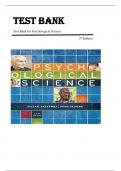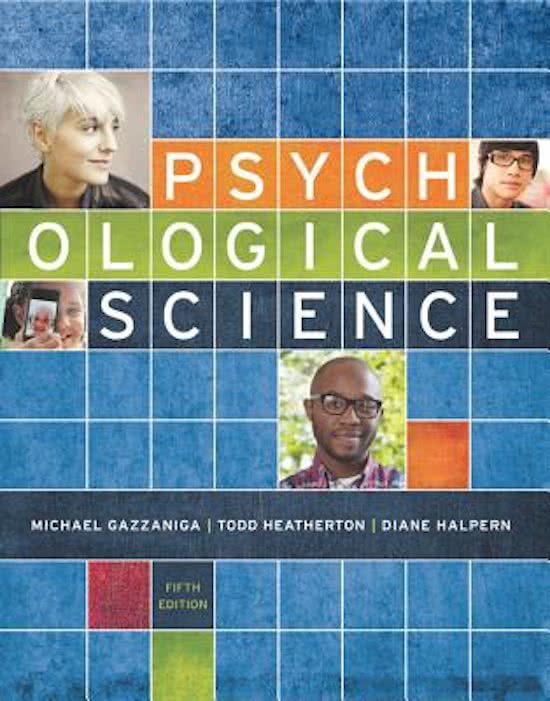TEST BANK
Test Bank for Psychological Science
5th Edition
PR
O
FD
O
C
,Table of Contents
Chapter 1: The Science of Psychology
Chapter 2: Research Methodology
Chapter 3: Biology and Behavior
Chapter 4: Consciousness
Chapter 5: Sensation and Perception
Chapter 6: Learning
PR
Chapter 7: Attention and Memory
Chapter 8: Language, Thinking, and Intelligence
O
Chapter 9: Human Development
FD
Chapter 10: Emotion and Motivation
Chapter 11: Health and Well-Being
O
Chapter 12: Social Psychology
C
Chapter 13: Personality
Chapter 14: Psychological Disorders
Chapter 15: Treatment of Psychological Disorders
,Michael Gazzaniga: Psychological Science 5th edition Test Bank
CHAPTER 01: The Science of Psychology
MULTIPLE CHOICE
1. Which of the following is the best definition of psychological science?
A. the study of the brain and its function
B. the study of the mind, the brain, and thought processes
C. the study of the mind, the brain, and behavior
D. the study of the mind, the psyche, and behavior
ANS: C DIF: Easy REF: 1.1 What Is Psychological Science?
OBJ: 1.1A NAT: APA Goal 1, Knowledge Base in Psychology
MSC: Remembering
2. Psychological science is the study of:
A. the mind. C. behavior.
PR
B. the brain. D. all of the above.
ANS: D DIF: Easy REF: 1.1 What Is Psychological Science?
OBJ: 1.1A NAT: APA Goal 1, Knowledge Base in Psychology
MSC: Remembering
3. Trying to understand the relationship between the actions of neurons and a thought is an example of
O
the connection between:
A. the brain and the mind. C. genes and the mind.
B. nature and nurture. D. the brain and emotion.
FD
ANS: A DIF: Moderate REF: 1.1 What Is Psychological Science?
OBJ: 1.1A NAT: APA Goal 1, Knowledge Base in Psychology
MSC: Applying
4. Based on your textbook’s definition of psychology, which statement best reflects the relationship
between the mind and the brain?
O
A. The brain is the same thing as the mind.
B. The brain influences the mind.
C. The brain is unrelated to the mind.
C
D. The brain reflects the mind.
ANS: B DIF: Moderate REF: 1.1 What Is Psychological Science?
OBJ: 1.1A NAT: APA Goal 1, Knowledge Base in Psychology
MSC: Applying
5. Barry and Candace are disagreeing. Barry states that psychology is the study of the mind. Candace
believes that psychology is the science of behavior. Given your knowledge of psychology, how would
you resolve this argument?
A. Barry is correct. Psychology only studies the mind.
B. Candace is correct. Psychology only studies behavior.
C. Both are correct. Psychology studies both the mind and behavior.
D. Both are incorrect. Psychology only studies emotions.
ANS: C DIF: Difficult REF: 1.1 What Is Psychological Science?
OBJ: 1.1A NAT: APA Goal 1, Knowledge Base in Psychology
MSC: Understanding
, 6. Allanah is a psychology major. Which of the following best describes what Allanah will learn about?
A. the structure and function of the brain
B. mental disorders and their treatments
C. feelings and other subjective states
D. the mind, the brain, and behavior
ANS: D DIF: Easy REF: 1.1 What Is Psychological Science?
OBJ: 1.1A NAT: APA Goal 1, Knowledge Base in Psychology
MSC: Understanding
7. For much of its history, psychologists focused mostly on:
A. the brain. C. behaviors.
B. disorders. D. the mind.
ANS: C DIF: Moderate REF: 1.1 What Is Psychological Science?
OBJ: 1.1A NAT: APA Goal 1, Knowledge Base in Psychology
MSC: Remembering
8. Which of the following is an example of a psychologist who is studying the mind?
A. Dr. Chu, who studies how weather influences children’s actions on the playground
PR
B. Dr. Well, who studies neural activity during sleep cycles of elderly adults
C. Dr. Mann, who studies the accuracy of traumatic memories over time
D. Dr. East, who studies the facial expressions of relationship partners during a fight
ANS: C DIF: Difficult REF: 1.1 What Is Psychological Science?
OBJ: 1.1A
O
NAT: APA Goal 1, Knowledge Base in Psychology | APA Goal 5, Professional Development
MSC: Applying
9. Which of the following is an example of a psychologist who is studying the brain?
FD
A. Dr. Fields, who studies the purchasing habits of impulsive individuals
B. Dr. Joe, who studies how neural activity changes as newborn babies develop
C. Dr. Perez, who studies how our feelings can influence our thought processes
D. Dr. Ladd, who studies the training activities of professional athletes
ANS: B DIF: Moderate REF: 1.1 What Is Psychological Science?
O
OBJ: 1.1A
NAT: APA Goal 1, Knowledge Base in Psychology | APA Goal 5, Professional Development
MSC: Applying
C
10. Which of the following is an example of a psychologist who is studying behavior?
A. Dr. Wick, who studies how certain smells can trigger certain feelings
B. Dr. Woods, who studies patterns of neural activity related to drug use
C. Dr. Paul, who studies the thought processes involved in decision making
D. Dr. Hull, who studies the facial expressions of relationship partners during a fight
ANS: D DIF: Moderate REF: 1.1 What Is Psychological Science?
OBJ: 1.1A
NAT: APA Goal 1, Knowledge Base in Psychology | APA Goal 5, Professional Development
MSC: Applying
11. According to your text, amiable skepticism is an important element in a type of reasoning called:
A. scholarly inquiry. C. analytic argumentation.
B. nay-sayerism. D. critical thinking.
ANS: D DIF: Easy





